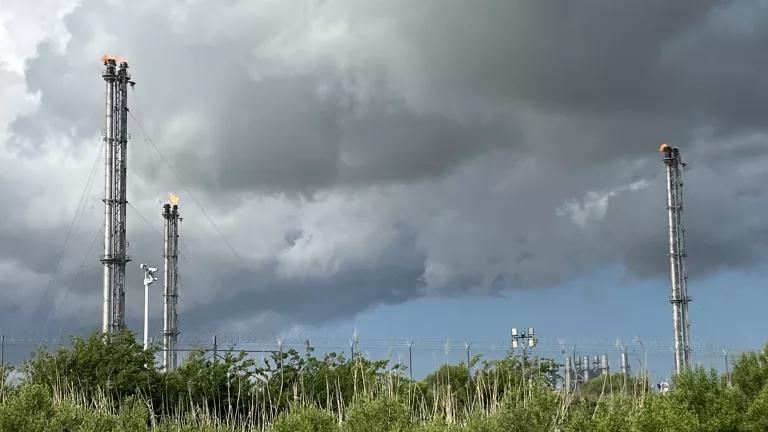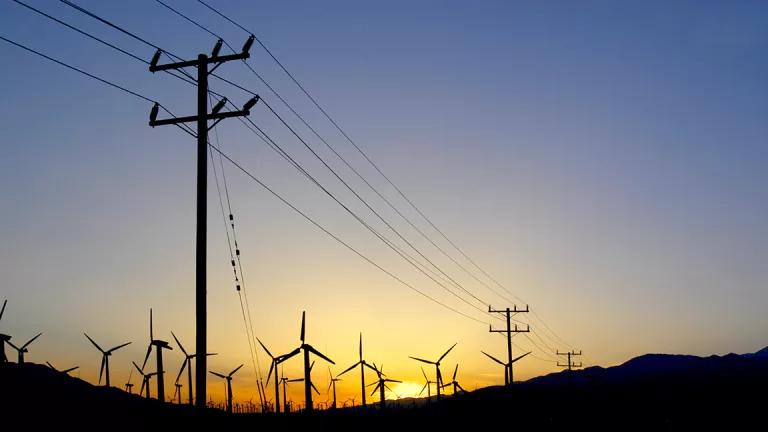Why General Electric Deserves a Lump of Coal for Christmas
General Electric (GE), the international energy behemoth that purports to work on reducing its environmental impact, deserves a lump of coal for Christmas. Why?
In September 2019, NRDC released a report documenting the fact that GE is planning to build a number of overseas coal-fired power plants, despite the disastrous impacts this would have on climate change and local air quality, mainly in developing countries. After requesting a meeting with the Board of Directors, NRDC received a written response from General Electric that made excuses for their projects. But the reality is, the world doesn’t need GE’s dirty, expensive coal plants. And it shouldn’t listen to GE’s disingenuous claims that it strives to be a good environmental steward.
Here are the reasons why those excuses do not hold up to the facts:
No. 1: GE’s coal plants undermine the UN Sustainable Development Goals and the Paris Agreement on Climate Change
GE claims that their coal plants are the solution to energy poverty and that they help governments reach the goals of the Paris Agreement on climate change and promote the United Nations’ “Sustainable Development Goals.” Nothing could be farther from the truth. The Secretary General of the United Nations, the person ultimately responsible for implementing the SDGs, has stated very clearly that it is “essential to stop the construction of new coal-based power plants from 2020 onwards.” At the UN climate summit in December 2019, he further elaborated: “Either we stop this addiction to coal or all our efforts to tackle climate change will be doomed.”
GE’s construction of coal plants are neither sustainable energy projects, nor in line with the recommendations of the UN Secretary General.
We’re asking the GE Board to make sure GE refrains from further use of the SDGs as an explanation for building coal plants, since coal plants are inconsistent with sustainable development and it is inaccurate for GE to suggest no alternatives to coal plants exist and that coal plants serve long term development goals. (There are plenty of clean energy alternatives, just no alternatives for which GE may be winning bids, which is an important distinction.) GE citing the sustainable development goals as an excuse for constructing coal plants and making such claims in GE’s Statement on Climate Change on the GE website is an insult to the public.
No. 2: GE’s coal plants are an economic burden for developing countries
GE claims it is providing affordable energy, but these coal plants in which GE is involved would actually lead to higher electricity costs for the public or require price subsidies from the public.
Kenya: The proposed project in Kenya, Lamu has received extensive economic scrutiny and the Kenyan government’s own analysis shows the project is likely to be a significant cost to the public in terms of raising electricity prices. GE would be dependent on subsidies from the people of Kenya to make any money at Lamu – raising energy costs to build a plant that will provide limited power to the people of Kenya. We have urged GE to properly assess the political risk of the project, and to get an independent assessment of the excessive electricity prices for the Lamu project, which would unnecessarily burden Kenyan households.
Kosovo: GE claims that Kosovo only has modest availability of feasible renewable energy resources, citing the World Bank. Yet GE somehow ignores the fact that the World Bank has refused to finance the Kosovo e Re coal plant. They seem willfully ignorant of the World Bank’s financial analysis showing that a renewable energy and battery storage system for Kosovo would be a cheaper option than building a new coal plant. The coal plant GE wants to build is a more expensive option, and Kosovo has cheaper, zero-carbon options for energy supply as identified in the World Bank analysis. Because of that analysis, the World Bank publicly indicated last year that it will not get involved in the Kosovo project.
Poland: The Ostroleka C power plant in which GE is involved would be “permanently unprofitable” without heavy subsidies from Polish taxpayers to prop up the project. The net present value of the project is negative, at -1.70 billion Euros.
GE claims it wants to provide efficient solutions to power generation, but in reality just wants to sell expensive coal equipment to countries.
No. 3: GE’s coal plants will produce high carbon emissions and pollution
GE claims its projects will have low emissions, but their coal plants will still produce extremely high emissions. (Their emissions analysis kept comparing GE projects to false hypothetical scenarios of dirtier coal plants, not to viable clean energy alternatives.)
The project GE is planning in Bosnia and Herzegovina does not comply with European Union finance standards and violates the union’s pollution control rules. GE did not address these issues at all in its response to NRDC’s inquiries.
Coal plants are already contributing to thousands of premature deaths every year in Vietnam, and GE’s Vung Ang 2 and Long Phu 1 will only make the situation worse.
NRDC has provided information about the modeling of health impacts from the pollutants that will be emitted from the Kenya, Lamu facility, if it is built. GE did not provide any response to the data regarding premature deaths from respiratory illness and the incidences of low birth weight births that would result from exposure to GE-supplied coal plants. Its silence is telling.
GE has provided no information about whether GE has any methodology to evaluate the number of premature deaths that will be associated with operation of the coal plant equipment supplied by GE. Nor any information if there is a threshold on annual or lifetime premature deaths associated with each project, above which GE wouldn’t approve sales of equipment.
No. 4: GE is involved in financially and politically risky projects
GE claims it wants to help governments build power projects in an affordable and reliable manner, yet it engages in deals with high risks (and subsidies from the public, as noted in previous sections).
When GE purchased the company Alstom, it also inherited responsibility for liabilities totaling several hundred million dollars (requiring a reserve amounting to $858 million for legal and compliance matters), because Alstom had several admitted violations of the Foreign Corrupt Practices Act. Alstom had already pled guilty and paid criminal penalties for those violations. The past FCPA violations by Alstom specifically included violations related to power projects. (Department of Justice: Alstom Pleads Guilty and Agrees to Pay $772 Million Criminal Penalty to Resolve Foreign Bribery Charges). This raises serious concerns about the staff and business practices to secure such contracts, and the potential of similar violations or questionable practices by this unit in new projects.
More and more coal projects are at risk of becoming “stranded assets” where their costs cannot be justified as coal plants must compete against lower-marginal-cost wind and solar projects. This is an even greater risk if countries adopt proper carbon pricing and strong climate protection policies.
A big risk of the high-carbon projects that GE is considering building include an increasing likelihood of sanctions by the U.S. government on GE’s partners for its coal projects. Legislation proposed in the U.S. Senate in November 2019 would allow sanctions to be imposed on GE partners in constructing coal plant projects if the project matches one of these criteria:
- “significantly undermines, as a result of timing or magnitude, adoption in the country of high-efficiency, low-carbon, or renewable energy technology or infrastructure” or
- “knowingly misrepresents the environmental impact of a project, investment, or product, including misrepresenting the amount of greenhouse gas emissions associated with the project, investment, or product”
Construction of a new coal plant in Kosovo quite clearly undermines adoption of energy efficiency and renewable energy in the country, meaning the risk of sanctions on key stakeholders and GE partners in this project are not insignificant.
In Vietnam, civil society groups have already documented the misrepresentation of the environmental impact of a project in the case of the Long Phu I coal project in which GE is involved. The carbon dioxide emissions impacts of the project were misrepresented in materials submitted to government authorities in Vietnam. On top of the sanctions on the Russian company involved in the project, further US sanctions risk could result from the data misrepresentation noted above. And GE’s push to convert the proposal from a super-critical plant to an ultra-supercritical coal plant will do relatively little in terms of lowering carbon emissions of the project, as the emissions would still be astronomically higher than clean energy alternatives already being developed in Vietnam.
Similarly, the Vung Ang 2 coal plant in Vietnam in which GE is involved undermines renewable energy development in Vietnam. Additionally, Vietnam’s Ministry of Planning and Investment decided against issuing an investment certificate for the project due to the lack of an updated environmental and social impact assessment conducted in accordance with environmental law, inconsistencies in the land use plans, and because the project sponsors had failed to raise sufficient investment. In addition, the ESIA failed to show that affected communities were properly consulted—with the vast majority of surveyed affected households not knowing basic information about the project.
Conclusion: GE should end involvement in coal plants not already operational by 2020
GE claims advanced grid infrastructure does not exist in many developing markets. And yet, the countries where GE wants to build coal plants are installing thousands of megawatts of renewable energy, like in Vietnam.
GE’s absolutist approach to making profits and its desperation to turn around the fortunes of the GE Power business by providing more expensive, dirty energy options in developing countries undermines the United Nations Sustainable Development Goals and the ability of countries to meet their goals under the Paris Agreement on Climate Change.
How could GE improve? It should cancel involvement in the projects in Kenya, Kosovo, Poland and Vietnam—and cancel other projects not yet built, and conduct more accurate analysis of alternative investment options in these places. Then it should invest more of its vast resources in clean energy development. That’s what would really help millions of people around the world today and protect our future.



